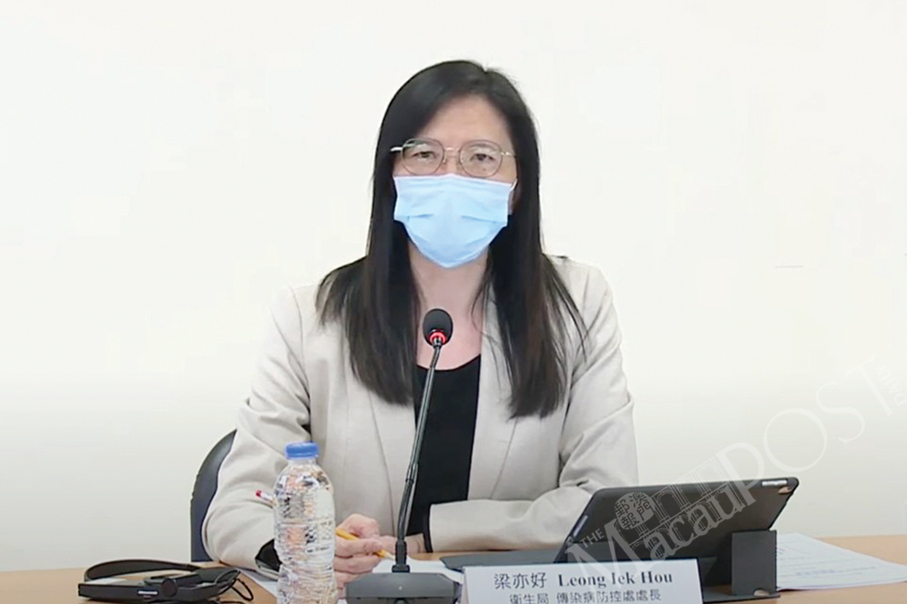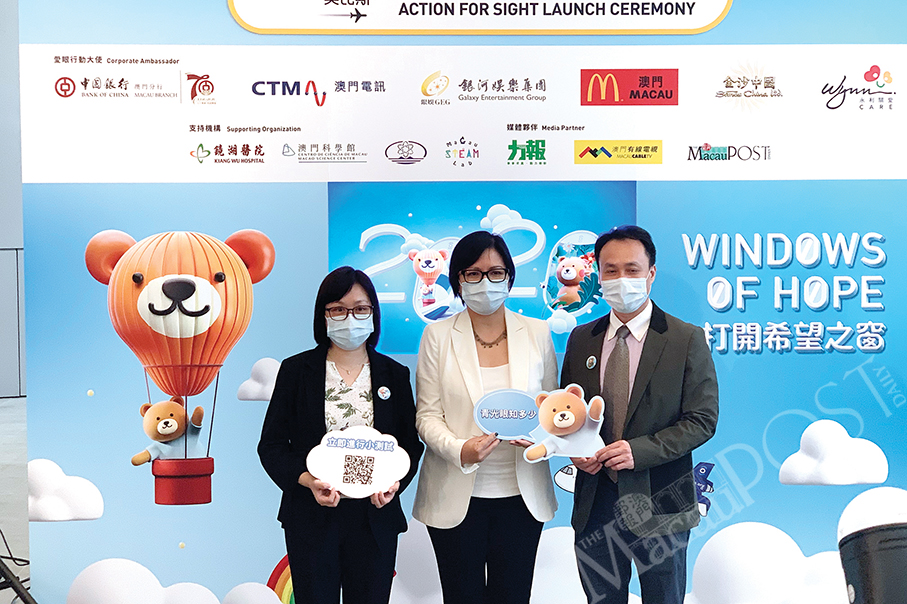The Macau government will shorten its hotel quarantine period for arrivals from foreign countries from 21 days to 14 days, which will take effect on Monday.
From Monday, those who have completed their 14-day hotel quarantine after arriving in Macau from foreign countries will have to practise seven days of “self-health management”.
Leong Iek Hou, who heads the Communicable Disease Prevention and Control Division of the Health Bureau (SSM), announced the new measure for arrivals from foreign countries, which will take effect at 00:00 on Monday, during yesterday’s regular press conference by the Novel Coronavirus Response and Coordination Centre.
However, Leong noted that the Macau government’s current entry ban on foreign nationals without a Macau ID card will remain unchanged.
Currently, only Macau residents, including foreign nationals holding a local ID card, are allowed to return to Macau from a foreign country, but they must undergo hotel quarantine for 21 days upon their arrival here.
Due to the COVID-19 pandemic, foreign nationals without a Macau ID card have, in general, been barred from entering Macau since March 2020, regardless of whether they are willing to undergo hotel quarantine. Exceptions to the entry ban have been granted for special cases only.
Mainland, Hong Kong and Taiwan compatriots who have been to a foreign country within 21 days prior to their intended entry into Macau are also barred from entering the city.
Currently, those arriving in Macau from Hong Kong or Taiwan must undergo 14 days of hotel quarantine, after which they are required to practise seven days of “strict self-health management”.
During yesterday’s press conference, Leong noted that the new measure that will take effect on Monday means that all those arriving in Macau from Hong Kong, Taiwan or foreign countries will then be subject to the same COVID-19 measure that will require them to undergo 14 days of hotel quarantine plus seven days of “strict self-health management”.
Leong said that those practising their seven-day “strict self-health management” will not be allowed to enter the mainland from Macau. During the seven-day period, their Macau Health Code colour will indicate yellow.
Those who have completed their seven-day “self-health management” will have their Macau Health Code colour return to green.
Those practising their seven-day “strict self-health management” must undergo four COVID-19 nucleic acid tests (NATs), on the first, second, fourth and last day of the period, Leong said.
According to Leong, those failing to undergo each of the four required tests before the required scheduled will have their Macau Health Code colour even turn red from yellow. Those whose health code colour has become red due to this reason will only have it return to yellow after undergoing the required test and provided that it comes up with a negative result, Leong said.
Only those with a green Macau Health Code are allowed to enter public premises, take public transport, and cross Macau’s border checkpoints.
Those with a yellow Macau Health Code are barred from entering certain premises and facilities, taking public transport, and crossing Macau checkpoints.
Those with a red Macau Health Code are subject to even stricter measures compared to those with a yellow health code. Those with a red code may be transferred to a quarantine facility depending on case-by-case assessments by health officials.
Assessing whether to relax NAT validity for arrivals from Zhuhai
Meanwhile, Leong also pledged during yesterday’s press conference that the Macau government is assessing with its Zhuhai counterpart whether the validity of the negative COVID-19 nucleic acid test (NAT) result for those entering Macau from Zhuhai can be raised back to 48 hours from the current 24 hours once the neighbouring city has zero new local COVID-19 cases for seven days.
Zhuhai has reported a total of four new local COVID-19 cases since Tuesday last week.
The validity of the negative NAT result for those entering Macau from Zhuhai was shortened to just 24 hours from 48 hours on Friday last week, after the Zhuhai health authorities confirmed a new local COVID-19 case in Nanping (南屏) town, which only lies a few kilometres northwest of Macau, on the previous day.
The validity of the negative NAT result for those entering Zhuhai from Macau has remained unchanged at seven days.
Consequently, the negative COVID-19 NAT result for those commuting between the two cities is currently valid for just 24 hours in reality.
Leong said yesterday that Zhuhai has not reported a new local COVID-19 case for a period of time, pointing out that the neighbouring city’s latest local case was confirmed on Saturday last week.
Consequently, Leong said, the Macau government will maintain close communication with its Zhuhai counterpart, assessing the feasibility of raising the NAT validity for those entering Macau from Zhuhai back to 48 hours seven days after the detection of the adjacent city’s latest local COVID-19 case.
Macau jab rate reaches nearly 84 pct
Meanwhile, Macau’s COVID-19 vaccination rate reached 83.95 percent at 4 p.m. yesterday, i.e., nearly 84 percent of the population had received at least one jab.
Leong reported Macau’s latest COVID-19 vaccination rates amongst different age groups. As of Wednesday, according to Leong, the vaccination rates amongst different age groups were: 46.3 percent amongst those aged from 3 to 11; 74.7 percent amongst those aged between 12 and 19; 95 percent amongst those aged from 20 to 29; 99.9 percent amongst those aged between 30 and 39; 99.9 percent amongst those aged from 40 to 49; and 92.3 percent amongst those aged between 50 and 59.
According to Leong, as of Wednesday the COVID-19 vaccination rate amongst senior citizens stood at 73.8 percent amongst those aged between 60 and 69; 63 percent amongst those aged from 70 to 79; and 37.9 percent amongst those aged 80 or over.
Leong noted that while Macau’s COVID-19 vaccination rates among young and middle-aged people, i.e., those aged between 20 and 59, are “very high”, exceeding 90 percent, the jab rates amongst children, teenagers and senior citizens are still relatively low.
Comparing Macau, Singapore jab rates
Leong also compared the latest COVID-19 vaccination rates among different age groups between Macau and Singapore. Leong noted that as of Tuesday last week, Singapore’s inoculation rate among all age groups reached at least 95 percent, except those aged between 5 and 11 who had a jab rate of 75 percent as of Tuesday last week.
Leong noted that thanks to Singapore’s high vaccination rate including senior citizens, its death rate among COVID-19 infections has been only 0.12 percent, which is only one fifth of the 0.6 percent in Hong Kong.
Leong said that even though Singapore has been reporting new local COVID-19 cases every day, its death rate amongst COVID-19 infections and the percentage of cases with serious conditions have remained low. Consequently, Leong said, Singapore has gradually started to ease its COVID-19 restrictions and control measures.
Leong also said that according to COVID-19 hospitalisation statistics as of March 8 in Hong Kong by the University of Hong Kong, those who had received two or three jabs had much higher protection against serious conditions and deaths compared to those who had received only one jab or had not been inoculated. Leong said that according to Hong Kong statistics, those with three jabs enjoy a protection rate of 98 percent against serious condition or death.

Leong Iek Hou, who heads the Health Bureau’s (SSM) Communicable Disease Prevention and Control Division, addresses yesterday’s press conference about the city’s COVID-19 situation. Photo: GCS








